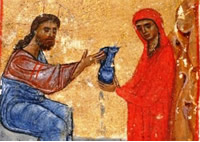Yes, there is an African hermeneutics of the Bible which grounds its interpretation on the African context and African issues; and asks questions about what’s happening in the context of Africa from its history to current issues; and wants to see how the Bible talks to those situations or [does] not talk to those situations.
I think one of the issues that is current is the issue of diseases, suffering that seems to be always on the continent of Africa. That takes people to have that as the starting point like HIV/AIDS, in this current time it would be Ebola for East Africa and West Africa. So those people would like to see how to get courage from the text or how to find or critique practices that might be risky in the situations in the context of Africa.
For example…
If a man dies, his wife will be inherited by a brother, [and] brother doesn’t necessarily mean just your siblings, your close siblings; it can be cousins who are considered to be in the same family group. So if a wife dies the husband can be given another woman from the same clan, same family, to replace the one who has died and so that’s the situations which have been revived because of wanting to bring up, bring back cultural practices that people used to think were being suppressed in colonialism.
If a wife dies and in the context of AIDS, whether it’s known or not known, there’s a chance that if a man then gets another wife, that is the way they are spreading the disease. So it used to be viewed as a cultural thing that was encouraged and then now it’s being discouraged but using scripture, using the text, rereading the passages that were originally not read in the same way.
Originally when missionaries came, they equated African traditional practices as being not biblical, and they critiqued, they rejected, polygyny you know, polygamy, and when the Africans started to read the Bible for themselves, especially the Old Testament and they found stories of Abraham, stories of Jacob having many wives and David having many wives and they said, “Oh, the Bible does not actually critique our culture, we are closer to the biblical way of life.”
Now the critique is that the practice, the way we refer to it in the biblical sense, it’s Levirate marriage where if a man dies with no heirs, his brother, surviving brother will marry the wife and the child will then be considered the child of the dead man. And so in Africa, it didn’t only apply if a man dies with no children. A wife, a woman was part of the property that was redistributed in death; so women were inherited whether or not they had given birth to sons or no children. So in the past that passage [Gen 38] would be read as Judah first refusing to give his only son. He was a bad model. While Tamar, in risking her life to get a son for Judah’s family was the way, was the model way; that was the valued way. Now it’s now Tamar who is looked at negatively and Judah is looked at positively.




